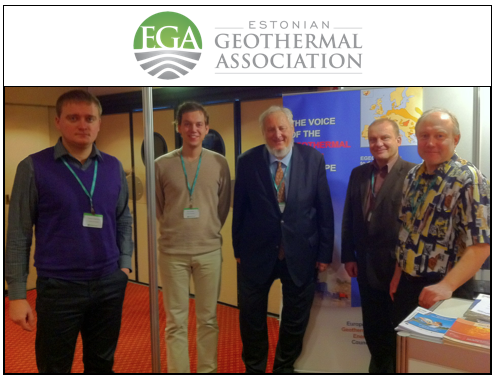About us
Overview of activities
Estonian Geothermal Association (EGA) is a non-profit R&D organization responsible for mapping, analyzing and efficiently implementing Estonian geothermal resources. EGA is the voice of Estonia in international co-operation projects relating to both shallow and deep geothermal energy. We are to promote, coordinate, and represent the position of Estonia in international research and projects.
Established in May 2011, EGA is a young but recognized organization backed by the Estonian Ministry of Environment, Tallinn University of Technology and Institute of Geology. EGA is a member of European Geothermal Energy Council, International Geothermal Association and GEOTRAINET, being the national training and certification coordinator for GSHP workforce.
The mission of EGA is to carry out research and development of geothermal energy in Estonia, including supporting adoption of uniform and appropriate legislation, rules and regulations for the development and utilization of geothermal energy resources. EGA serves as a national expert in providing unbiased input and disseminates information among interest groups legislators.
In May 2012, the Minister of Environment Ms. Keit Pentus, informed the wider public of the need for geothermal energy potential to be studied in Estonian conditions for “practical, affordable and environmentally friendly solutions for the future“. This was done during an introductory forum to geothermal, chaired by EGA (in co-operation with GEO.POWER project) and attended by representatives from 11 research institutions in Europe, working with geothermal. Since its formation EGA has visited practical applications and industry experts in Sweden, Italy, Bulgary and Belgium among others. Currently EGA is drafting preliminary policy documents to be included in the legislation.
On the picture below 4 board members (from left: Mr. Tarmo Stahhov, Mr. Uku Sukles, Ph.D. Alvar Soesoo, Mr. Sulo Nigul) of the Estonian Geothermal Association together with the president of European Geothermal Energy Council, Dr. Burkhard Sanner (in the middle).

Selected activities in 2011:
In 2011 EGA was represented at two geothermal trade fairs in Europe: Geothermal Expo 2011 and the GeoPower Europe 2011. In October 2011, Tallinn University of Technology (TUT), one of the most prominent universities in Estonia, officially endorsed the activities, and confirmed that TUT attaches great importance to the plans and ventures of EGA, and its consequence and gravity to developments and the future of the Estonian energy sector, by also confirming support the geothermal field technicians in their projects and enterprises by providing further know-how and assistance from scholars/scientists if needed.
In November 2011 the Institute of Geology and EGA organized a forum in Tallinn dedicated to the implementation of geothermal energy. The forum was presented and coupled to the GEO.POWER project, which is co-ordinated by EGA. Opening speech by Mr Erkki Truve, Vice Rector at Tallinn University of Technology, pointed out the wide need for geothermal energy to be extensively studied and applied, particularly in Estonian conditions. EGA plans to continue to organize similar forums aimed at bringing together the best ideas and insights from different disciplines.
The Ministry of the Environment, in November 2011, formally endorsed its support of the initiative of EGA’s mapping of geothermal potential in Estonia as well as EGA’s actions in contributing to the fuel and energy sector’s development for long-term strategic objectives. The same month, EGA was accepted membership to the two largest organizations in Europe, European Geothermal Energy Council and International Geothermal Association.
In December of 2011 a round table was held with EGA, the Ministry of the Environment, the Ministry of Economic Affairs and Communications Ministry to discuss the framework for future steps in the field of geothermal energy development and trends. EGA continues implementation of activities designed to achieve statute objectives, and among other things, to increase the potential for geothermal research and consequently its broadening implementation in Estonia.
For additional information please feel free to contact us.
Contact information

- Address:
Ehitajate tee 5, Institute of Geology
Tallinn University of Technology
Tallinn, 19086, Estonia - Tel: (+372) 51 744 76
- E-mail: us@geothermal.org.ee


